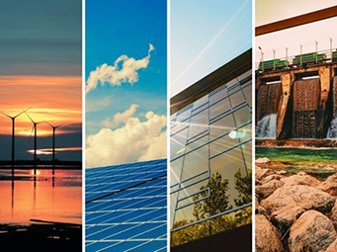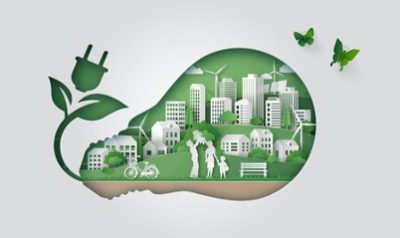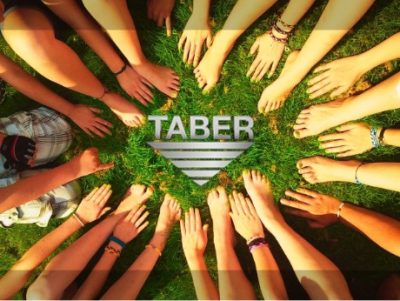U.S. Aluminum Extruder Study: Aluminum Extrusions in Energy

In our past articles, we’ve delved into the many benefits of aluminum and its role in shaping and building everything around us. This generous element with its many properties has proven time and again how it became the go-to material for designers and engineers across all sectors.
Today, we’ll be looking into how aluminum — particularly the aluminum extrusion industry — plays a role in a sector that is rapidly growing and changing how we harness the power of nature around us — energy.
The dynamic and symbiotic relationship between these sectors is pivotal to our world today. It is only fitting that we at Taber, a U.S. aluminum extruder company and among the industry leaders in sustainable aluminum products, showcase how we can make the most of this relationship to effectively harness renewable energy that is readily available to us.
As Elon Musk put it, “We have this handy fusion reactor in the sky called the sun; you don’t have to do anything, it just works. It shows up every day.”
Aluminum Extrusion Industry + Energy Sector = Sustainable Limitless Energy
The aluminum extrusion industry presents a myriad of offerings to the energy sector, positioning itself as a cornerstone of sustainable innovation. Leveraging the unique properties of aluminum, the extrusion process enhances the metal and makes it possible to create profiles that can be used for a variety of components. These components are essential for optimizing efficiency in various applications such as wind turbines, solar panels, and transmission systems to name a few.
What does aluminum extrusion offer compared to other metals?
- Versatility in shape and design ✅
- Durability and resistance to corrosion ✅
- High thermal conductivity ✅
- Reflective surface ✅
- High strength-to-weight ratio ✅
- Cost efficiency and decreased maintenance ✅
- Unlimited recyclability ✅
Solar Energy
The most common and widely used form of solar energy today is photovoltaic solar panels or PV systems that harness radiant light from the sun and convert it to electricity. They are utilized for both small and large-scale applications providing electricity that power small electronic devices to large sun farms that can provide power to entire cities.

Aluminum extruded components are widely used in PV systems because of their rich properties. In a 2020 study by the World Bank, PV systems use 85% aluminum for their systems. Taber Extrusions offers a wide range of profiles and extrusion capabilities for your solar energy components:
Solar panel frames
The lightweight nature of aluminum ensures that the frames do not add unnecessary weight to the PV system. Additionally, the resistance to corrosion properties of aluminum enables the frames to withstand exposure to various weather conditions.
Mounting systems (racking and trackers)
Mounting systems, which secure solar panels to rooftops, ground installations, or other structures, use aluminum extrusions. One reason they are used is because of strong and adaptable frameworks that can be customized to fit different installation scenarios.
Heat sinks and dissipators
Solar panels can generate heat during operation, which can impact their efficiency. Aluminum’s high thermal conductivity makes it an excellent choice for creating heat sinks and dissipators, that help regulate the temperature of the solar panels and maintain their optimal performance.
Enclosures and junction boxes
Extruded aluminum is used to create enclosures and junction boxes that house electrical components within the PV system. They protect electrical and mechanical components from environmental factors and allow efficient heat dissipation.
Wind Energy
Wind turbines or mills predominantly use other materials such as steel, copper, plastic, and wood. According to the USGS, wind energy uses about 2% aluminum in its production. However, in recent years, aluminum is catching on because of the properties that make it easy to work with and its proven economic benefits.
It outperforms all other metals in terms of corrosion resistance, making it exceptionally well-suited for maritime environments. It is particularly advantageous for offshore wind turbines, where the onslaught of waves, humidity, salty sea air, and storms can accelerate corrosion.
According to an article by alcirclebiz.com, while copper typically reigns supreme as the wiring material of choice, experts in the field of wind turbines are now exploring an alternative: aluminum. Aluminum wiring cost less compared to copper helping reduce project costs. It also weighs approximately 70% less than copper, rendering electrical cables crafted from aluminum not only lightweight but also easier to install.
Hydropower Energy
A hydropower plant generates energy using the motion of water. The water is directed through a pipe, known as a penstock, where it exerts pressure on turbine blades. In turn, these blades are set into motion, causing the turbine to rotate and drive a generator, ultimately producing electricity. Because water causes corrosion to some metals, aluminum alloys are used to reduce cost and corrosion in components.
Here’s how aluminum and aluminum extrusion can be utilized in hydropower energy:
- Penstock structures
- Gates and valves
- Turbine components
- Intake structures
- Cooling and ventilation systems
- Control panels and electrical enclosures
- Support structures for hydro facilities
Green Buildings and Infrastructure

In the construction industry, the lightweight yet strong, malleable, and recyclable nature of extruded aluminum aligns perfectly with the principles of eco-friendly design. Consequently, green buildings and structures are highly incentivized by governments around the world and have been gaining popularity in recent years.
Here’s how aluminum extrusion brings elegance and sustainability to modern architecture:
- Energy-efficient windows and doors
- Solar panel mounting systems
- Facade and curtain wall systems
- Structural components
- HVAC systems and ductwork
- Interior design elements
- Efficient lighting systems
- Water management and rainwater harvesting
- Accessible ramps and railings
Beyond their environmental benefits, alternative energy sources also present significant economic opportunities. As nations transition to cleaner energy, they unlock new avenues for job creation, technological innovation, and sustainable economic growth. Alternative energy sources reduce reliance on imported fossil fuels, enhancing energy security and minimizing vulnerability to price fluctuations and geopolitical tensions.

U.S. Aluminum Extrusions Industry Working Together on Sustainability
The U.S. aluminum extrusion industry, and leading extruders like Taber Extrusions, are dedicated to pushing boundaries in terms of innovation. They are setting the stage for responsible energy solutions. Their commitment to sustainability isn’t just inspiring; it’s groundbreaking.
It’s about building and designing a world where energy efficiency and environmental responsibility meet advanced research and technology. This partnership isn’t just about structures; it’s about reshaping our future.
The path to sustainability is paved with aluminum extrusion, with Taber Extrusions leading the way.

More About Taber Extrusions
Founded in 1973, Taber Extrusions originally pioneered a process for extruding rectangular billet which enables the company to extrude solid profiles up to 31 inches wide or hollows up to 29 inches. Taber expanded with the purchase of an extrusion facility in Gulfport, MS, in 1995 which houses a new state-of-the-art cast house and two additional presses, has micro-extrusion capabilities, and a fabrication area that has been expanded multiple times.
Taber continues to extrude billet in a wide range of alloys and sizes and has diversified its markets beyond the military since its inception to include aerospace, automotive, marine, infrastructure, and sporting goods, among many others. For these markets, the company supplies cast and extruded products in a variety of soft and hard alloys.
Today, Taber Extrusions has completed the addition of in-house friction stir welding capabilities and carries on their offering of extruded aluminum components, value-added machining services, and raw material supply to the North American market – making them a vertically integrated supplier of FSW panels and assemblies never seen in North America.
Follow us on Social Media:
LINKEDIN: https://www.linkedin.com/company/8843183/
FACEBOOK: https://www.facebook.com/taberextrusions/
TWITTER: https://twitter.com/taberextrusions
YOUTUBE: https://www.youtube.com/@TaberExtrusions
Interested in becoming a part of the Taber Team? Submit your resume to careers@taberextrusions.com. Visit us: www.taberextrusions.com or call us at (888) 985-5319.
